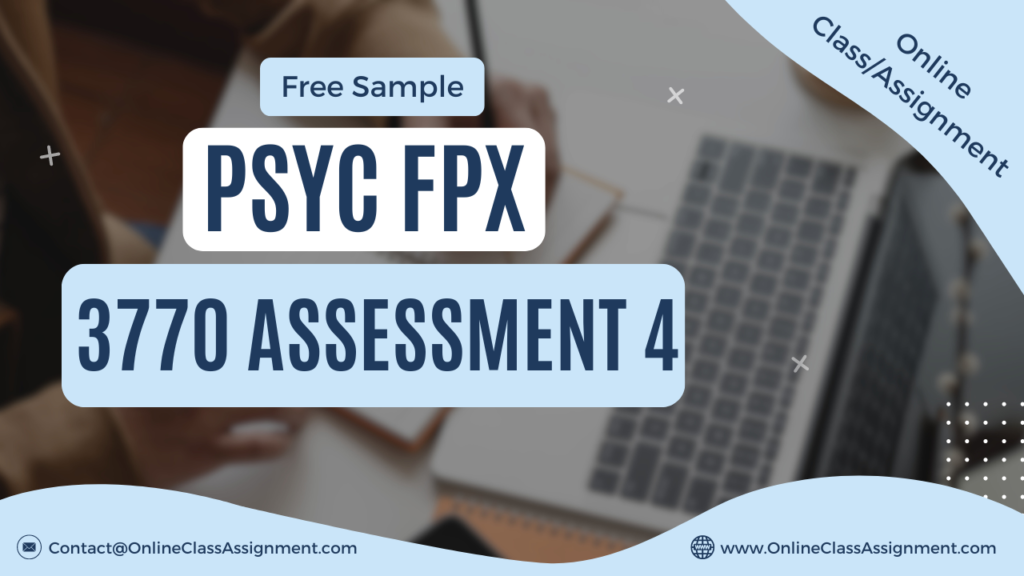PSYC FPX 3770 Assessment 4 Depression and Goal-Directed Motivation

PSYC FPX 3770 Assessment 4 Depression and Goal-Directed Motivation
Student Name
Capella University
PSYC FPX 3770 Psychology of Human Motivation and Performance
Prof. Name
Date
Emotional Influences on Motivation
Motivation, the driving force behind action, can be swayed by a myriad of factors, both positively and negatively. Life experiences, whether uplifting or detrimental, play a pivotal role in shaping motivation, steering individuals towards desired goals or away from aversive stimuli. For example, substances such as drugs and experiences like sex trigger the release of neurotransmitters such as dopamine, inducing feelings of pleasure and euphoria. These outcomes condition individuals to seek further exposure to stimuli associated with positive feelings. Moreover, perceived outcomes, even if not yet realized, wield significant influence over motivation. Emotions, intricately entwined with motivation, add another layer of complexity to this dynamic, rendering it challenging to precisely delineate the impact of a specific emotion on motivation (Deckers, 2018).
Interplay of Emotions and Motivation
Emotions stem from perceived or experienced outcomes and often coexist or clash with one another. Positive emotions, such as feelings of contentment and security, can bolster motivation, propelling individuals to confront arduous tasks in pursuit of rewards or relaxation. Conversely, the effect of negative emotions on motivation is multifaceted. While stimuli signaling threat can bolster motivation by alerting individuals to potential dangers, emotions like apprehension and distress can stifle motivation and diminish overall well-being. Prolonged experiences of anxiety and fear have been associated with adverse health outcomes and a reduction in positive social interactions (Deckers, 2018).
Depression’s Impact on Motivation
Depression, characterized by persistent feelings of melancholy and disinterest in life, manifests uniquely in each individual but consistently dampens motivation (Hysenbegasi, Hass & Rowland, 2005). Melancholy, a prevalent emotion linked with depression, may serve as a cry for assistance but often results in diminished motivation and involvement in life’s affairs. Individuals grappling with depression may find it challenging to carry out daily tasks such as personal grooming, household chores, and financial management. In educational settings, depression can profoundly affect performance due to its impact on cognitive abilities and task prioritization (Deckers, 2018).
Research suggests that depression can skew individuals’ perceptions of themselves and their experiences, leading to biases such as the “self-positivity bias” (Takano et al., 2016). This bias involves attributing positive events to external factors while internalizing negative ones. Studies indicate that individuals with depression exhibit a reduced inclination towards positive self-relevant information, underscoring the cognitive distortions associated with the condition (Takano et al., 2016).
Current Research Insights
A 2016 study delved into the self-positivity bias among individuals grappling with depression, uncovering a diminished preference for positive self-relevant information within this cohort (Takano et al., 2016). Another study from 2005 investigated depression’s impact on academic productivity, revealing a negative correlation between depression and GPA among university students (Hysenbegasi, Hass & Rowland, 2005). Treatment for depressive symptoms was linked with mitigated academic decline, underscoring the significance of mental health interventions in fostering academic success (Hysenbegasi, Hass & Rowland, 2005).
PSYC FPX 3770 Assessment 4 Depression and Goal-Directed Motivation
Conclusion
Depression presents formidable obstacles, particularly in academic environments where motivation and determination are paramount for success. Grasping the intricate interplay between depression, motivation, and academic achievement is imperative for crafting effective intervention strategies. Provision of accessible mental health support and counseling services on campuses can mitigate depression’s impact on student well-being and academic performance (Deckers, 2018; Hysenbegasi, Hass & Rowland, 2005; Takano et al., 2016).
References
Deckers, L. (2018). Motivation: Biological, psychological, and environmental. ProQuest Ebook Central.
Hysenbegasi, A., Hass, S. L., & Rowland, C. R. (2005). The impact of depression on the academic productivity of university students. Journal of Mental Health Policy and Economics, 8(3), 145.
PSYC FPX 3770 Assessment 4 Depression and Goal-Directed Motivation
Takano, K., Iijima, Y., Sakamoto, S., Raes, F., & Tanno, Y. (2016). Is self-positive information more appealing than money? Individual differences in positivity bias according to depressive symptoms. Cognition and Emotion, 30(8), 1402-1414.
Get Capella University Free MS Psychology Samples
PSY FPX 5002
PSY FPX 6710
- PSY FPX 6710 Assessment 6 Training Evaluation
- PSY FPX 6710 Assessment 5 Virtual Excellence
- PSY FPX 6710 Assessment 4 Intervention Proposal to Address
- PSY FPX 6710 Assessment 3 East Assignment Coaching Plan
- PSY FPX 6710 Assessment 2 Proposal for Conducting Candidate Screens
- PSY FPX 6710 Assessment 1 I/O Scholar Practice Gap
PSY FPX 5110
PSY FPX 6720
- PSY FPX 6720 Assessment 6 Human Resources Strategic Plan for Leadership Development
- PSY FPX 6720 Assessment 5 Critical Analysis of Leadership Theories
- PSY FPX 6720 Assessment 4 Leader Development
- PSY FPX 6720 Assessment 3 Self-Leadership
- PSY FPX 6720 Assessment 2 The Importance of Leadership and Diversity
- PSY FPX 6720 Assessment 1 The Importance of Leader Values, Traits, and Context
PSY FPX 6730
- PSY FPX 6730 Assessment 6 Growth and Development
- PSY FPX 6730 Assessment 5 Case Study: Implementation
- PSY FPX 6730 Assessment 4 Theoretical Foundations
- PSY FPX 6730 Assessment 3 Consultation Discovery Process
- PSY FPX 6730 Assessment 2 Entry and Contracting: A Case Study Description
- PSY FPX 6730 Assessment 1 Entry and Contracting: Analysis of ABC Bank
PSY FPX 6740
- PSY FPX 6740 Assessment 5 Ethical and Legal Aspects of I-O Psychology
- PSY FPX 6740 Assessment 4 Planning
- PSY FPX 6740 Assessment 3 Human Resource Development and Training, A Case Study
- PSY FPX 6740 Assessment 2 Values and Diversity
- PSY FPX 6740 Assessment 1 Psychological Foundations in Human Resources and Personnel
PSY FPX 7610
PSY FPX 6O15
